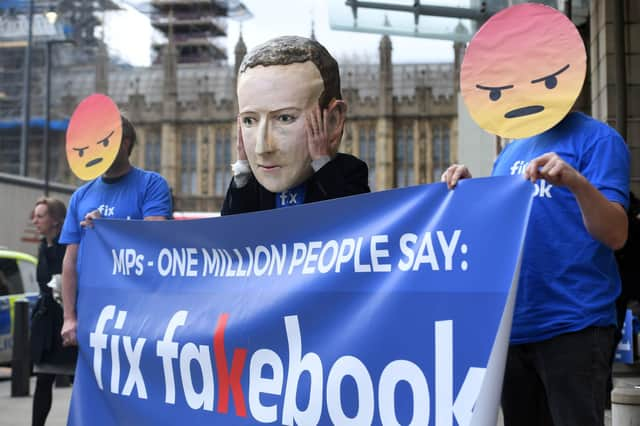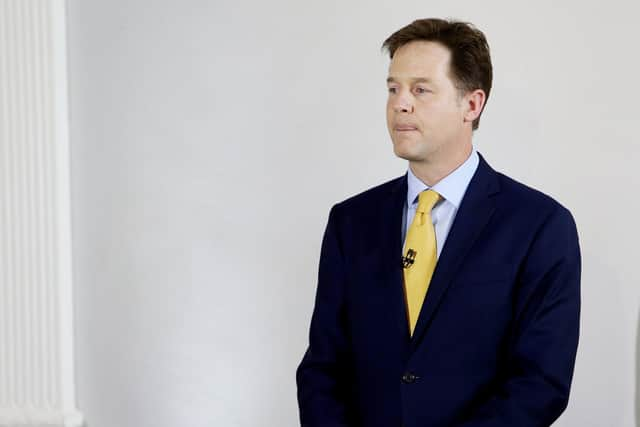Must our teachers shout into the wind to be heard over noise of ‘social’ media? – David Behrens


This was never more apparent than on Tuesday, when it emerged that six teachers in 10 had become worried about their pupils’ online safety as they retreated to the internet while the schools were closed.
A couple of days later, another study confirmed their worst fears. Many students, it reported, were now funding their university courses by posting explicit pictures of themselves to an online subscription service.
Advertisement
Hide AdAdvertisement
Hide AdOnly a year or two separates these two groups of young people. Virtual prostitution, it seems, is the price society is having to pay for trebling their tuition fees a decade ago.


Every parent will recognise the helplessness of watching children of any age disappearing into their rooms to conduct their affairs online. Most of us have no idea what that involves; we trust only that we have brought them up with enough sense to spot dangers when they are encountered.
But it’s a fool’s paradise. Peer pressure has moved online along with the lessons, and it is a force more powerful than any teacher.
Advertisement
Hide AdAdvertisement
Hide AdI have mulled this over at some length these last few days as I prepared to pack off Behrens junior on the first step of his journey down that very career path.
Is he destined to spend his days shouting into the wind to make himself heard over the cacophony of what we paradoxically call “social” media?
The return to physical classrooms will help, but it doesn’t change the inconvenient truth that the internet is out of control.
The extent of its anarchy was laid bare on Tuesday when it emerged that children as young as 13 had been exposed to a video of a man taking his own life. He had streamed his suicide live on Facebook, and there the footage remained. The company initially refused to remove it, saying it did not breach its “community standards”.
Advertisement
Hide AdAdvertisement
Hide AdAs the chapter unfolded, Facebook broke cover to defend its strategy for the US election in November. It would “more aggressively” label posts designed to manipulate or mislead voters, it said. Not remove them, mark you; just label them.
The supreme irony is that its messenger was Nick Clegg, the former Sheffield MP and Liberal Democrat leader who sold his soul to the devil not once but twice – first to David Cameron and then to Facebook’s guileless boss, Mark Zuckerberg. It was Clegg who promised to phase out tuition fees altogether, but then conspired with the Conservatives to raise them three-fold.
He vowed after that debacle to never again make a promise he didn’t know he could keep. Perhaps that’s why he is now promising so little on his new employer’s behalf.
Advertisement
Hide AdAdvertisement
Hide AdNo sooner had his latest words dropped from his mouth than one of Facebook’s engineers very publicly resigned, saying he could no longer work for an organisation “choosing to be on the wrong side of history”. It is not something that appears to trouble Mr Clegg’s conscience.
I am very far from being a Luddite; I was building websites before Mark Zuckerberg was in high school. But with each new generation, the taste and decency threshold is lowered, and today it is hard not to be appalled at what sections of the internet have become. Even Behrens junior, at 22, considers some of it beyond the pale.
Tim Berners-Lee, the British scientist who invented the web, put his finger on it in a speech marking its 30th anniversary. The system, he said, creates perverse incentives which commercially reward clickbait and the viral spread of misinformation. Services that were intended to be benevolent are instead subsumed by outraged and polarised discourse.
Advertisement
Hide AdAdvertisement
Hide AdHumanity, in other words has reduced the invention to its own level.
It was the Mark Zuckerbergs of this world who created this cancer within our society and they who must be made to excise it. But that is not going to happen while former politicians are prepared to be their apologists.
If Facebook and others are to be allowed continued access to British audiences, we’re going to need a strong regulator with the power to impose on them the same standards we expect from our broadcasters. From where might this almighty being come? Not the Liberal Democrats, that’s for sure.
Support The Yorkshire Post and become a subscriber today.
Your subscription will help us to continue to bring quality news to the people of Yorkshire. In return, you’ll see fewer ads on site, get free access to our app and receive exclusive members-only offers.
Advertisement
Hide AdAdvertisement
Hide AdSo, please – if you can – pay for our work. Just £5 per month is the starting point. If you think that which we are trying to achieve is worth more, you can pay us what you think we are worth. By doing so, you will be investing in something that is becoming increasingly rare. Independent journalism that cares less about right and left and more about right and wrong. Journalism you can trust.
Thank you
James Mitchinson
Comment Guidelines
National World encourages reader discussion on our stories. User feedback, insights and back-and-forth exchanges add a rich layer of context to reporting. Please review our Community Guidelines before commenting.